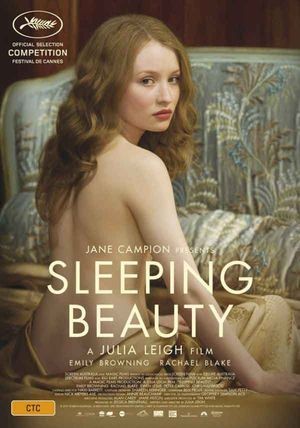Art Film Confidential: Julia Leigh Fires a Shot Across the Bough

A bold feminist exploitation think-piece about the perceived and disguised societal demands placed on women, "Sleeping Beauty" is a hauntingly erotic film that languishes in the recesses of your sub-conscious. With the producing endorsement of famed director Jane Campion ("The Piano"), Australian novelist-turned-filmmaker Julia Leigh explores what she terms "Wonder Cinema" by way of the Sleeping Beauty fairytale which she embellishes and extrapolates upon. Yasunari Kawabata's "The House of Sleeping Beauties" and Gabriel Garcia Marquez's "Memories of My Melancholy Whores" are meaningful tomes of reference.
Waifish Emily Browning ("The Uninvited") is Lucy, an Australian college student working various jobs to make ends meet. She gives her esophagus and stomach up to paid medical testing, works in a restaurant, and collates copies for a tyrannical female boss. In her spare time the free spirited lass likes to indulge in spontaneous meat-market pick-ups with random men and women. Casual drug use is on the menu. Ideals of shame or restraint are not in Lucy's vocabulary. She's a poker-faced extreme urban explorer.
Emily takes on a high-paid position as a nude banquet server for private dinner parties put on in the private mansion of an elegant Madame named Clara (Rachael Blake). After serving her first dinner party Lucy burns a hundred dollar note from her ample pay. Capitalism isn't her motivation in life. The fearless femme de provocation is promoted to the position of a sleeper. Mistress Clara administers a sleeping potion that ensures Lucy's unconscious state for a male client to do with as he pleases in bed--short of marking or penetrating Lucy's impossibly nubile body. The idea of semi-impotent older men paying to lie down with an unconscious nubile girl connects to the obvious choice one such man might make to end his life during the experience. The three episodes we witness reflect on damaged male psyches grappling desperately for a self-identifying conquest of a clinical nature. Each episode is prefigured by a host/client chat that allows for some character explanation on the part of the ostensibly misogynistic men.
In her private time Lucy likes to spend time with her best friend, an alcoholic bachelor edging closer to committing suicide. The two communicate in a shorthand of polite repartee that disguises their deeper emotional issues. The subplot is the most forced in the film, but contributes a layer of altruism to Lucy's transparent identity.
The deeply sensual character exists at the polar opposite extreme to American cinema's Mumblecore movement of dumbed-down lazy slackerdom. Lucy takes action with gusto even if it means giving herself wholly over to an experience she can't consciously interact with. "Sleeping Beauty" is an artistic exploitation film meant to rankle bourgeoisie attitudes of propriety. It’s a dirty job, but Julia Leigh has done it with panache.
Not Rated. 104 mins. (B-) (Three Stars - out of five/no halves)






